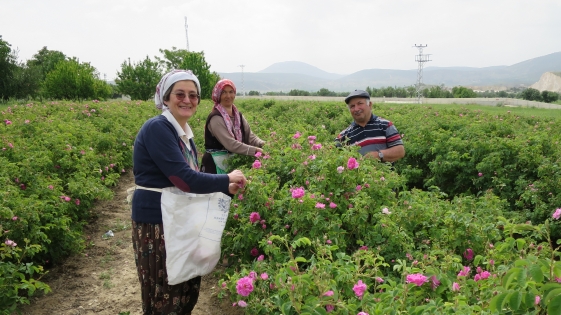Pecunia non olet but Does Rose Money Smell? On rose and rose oil prices and moral economy in Isparta

Serdecznie zapraszamy wszystkich zainteresowanych na otwarte seminarium naukowe IEiAK UW i Stowarzyszenia Pracownia Etnograficzna
Prof. Lale Yalçın-Heckmann wygłosi wykład
Pecunia non olet but Does Rose Money Smell?
On rose and rose oil prices and moral economy in Isparta
komentarz dr Amanda Krzyworzeka
This paper investigates rose and rose oil production in the province of Isparta with reference to the discourses on and procedures of price formation. Farmers have been engaging in rose cultivation for over a century and rose oil production is considered to be a traditional industry. The market actors for rose oil are global functioning cosmetic firms andalmost all rose oil from Isparta is exported. Prices and production have been steadily increasing in the last seven years. Although prices are seen as good, there are concerns about over-production and harsh competition between the rose oil firms for buying the harvest, hence pushing up rose prices and, leading to a crash of rose oil prices on the world market. Through careful observation of payment and price formation procedures, the paper raises issues concerning the moral economy of price formation. Findings are provisional and the research is on-going, but the discourse on prices clearly suggests that value judgements are embedded in capitalist markets rather than being simply or primarily anti-market.
Prof. Lale Yalçın-Heckmann has studied sociology at the Bosphorus University, Istanbul and anthropology at the London School of Economics. After working at the Middle East Technical University in Ankara, she has carried out research and taught at the universities Erlangen, Bamberg and Free University Berlin. From 2000-2009 she was a senior researcher working on privatization and agrarian property in Azerbaijan at the Max Planck Institute for Social Anthropology in Halle/Saale. There she also led the research group “Caucasian Boundaries and Citizenship from Below” on the South Caucasus (2006-2009). Since her habilitation at the Martin-Luther University in Halle-Wittenberg, she has been a temporary professor and recently awarded apl. Professorship at this university. She is Docent at the University of Pardubice, the Czech Republic, the Department of Social Anthropology, a faculty member of the Max Planck International Graduate School ANARCHIE and senior researcher and coordinator of the ERC Project “Realising Eurasia”.
Her research areas and themes among others include Kurds in Turkey and the Caucasus, migrants and Islam in Europe, gender and kinship, property and rural economy in Azerbaijan, citizenship, migration, ethnicity, economic, and political anthropology, especially in reference to the Caucasus and Turkey.
SEMINARIA NAUKOWE IEiAK - w trakcie seminariów badania prezentują pracownicy instytutu, a także antropolodzy i przedstawiciele pokrewnych dyscyplin z kraju i ze świata. To okazja do zapoznania się z najnowszymi badaniami i swobodnej dyskusji w kameralnej atmosferze. Spotkania są otwarte dla publiczności. Serdecznie zapraszamy wszystkich zainteresowanych: zarówno badaczy, jak i studentów, absolwentów oraz wszelkie osoby, którym bliska jest tematyka seminariów. Dowiedz się więcej
Spotkanie odbywa się w ramach projektu „Antropologia dziś - otwarte seminaria naukowe” .
Projekt „Antropologia dziś - otwarte seminaria naukowe” finansowany w ramach umowy 903/1/P-DUN/2016 ze środków Ministera Nauki i Szkolnictwa Wyższego przeznaczonych na działalność upowszechniającą naukę.
Projekt jest realizowany przez Stowarzyszenie „Pracownia Etnograficzna” im. Witolda Dynowskiego we współpracy z Instytutem Etnologii i Antropologii Kulturowej UW.


